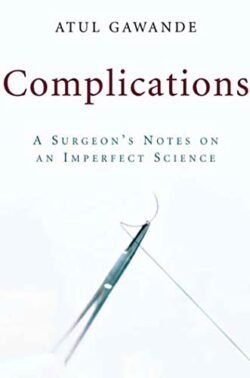“When Breath Becomes Air” by Paul Kalanithi, published posthumously in 2016, is a profound and poignant memoir that explores life, death, and the meaning of existence from the unique perspective of a neurosurgeon faced with terminal cancer. Paul Kalanithi, who was completing his training as a neurosurgeon and neuroscientist, was diagnosed with stage IV lung cancer at the age of 36. The memoir recounts Kalanithi’s journey from a medical student obsessed with the question of what makes life worth living to a neurosurgeon at Stanford working on the brain, the most critical place for human identity, and finally to a patient and a new father confronting his own mortality. Character Analysis Paul Kalanithi: Paul Kalanithi is both the author and the subject of the memoir, offering a deeply personal and introspective look at his life, career, and battle with cancer. His reflections on the challenges of facing death provide insights into the human condition and the intersection of life’s meaning with the practice of medicine. Kalanithi’s profound understanding of literature, philosophy, and science enriches his narrative, making his exploration of life and death universally relatable and deeply moving. Themes and Analysis Meaning and Mortality: Central to the memoir is the exploration of what gives life meaning, especially in the face of death. Kalanithi’s diagnosis prompts him to examine his beliefs and values, leading readers on a philosophical journey that questions the essence of living a meaningful life. The Doctor-Patient Relationship: Kalanithi offers a unique perspective on the dynamics of being both a doctor and a patient, providing valuable insights into empathy, compassion, and the complexities of medical ethics. Identity and Change: The memoir delves into the impact of illness on one’s sense of self and the process of adapting to profound changes in life circumstances. Kalanithi’s transition from a caregiver to a patient highlights the fragility of identity and the human capacity for resilience. “When Breath Becomes Air” is a masterpiece that bridges the gap between art and science, offering a heartfelt meditation on the challenges of confronting death and the quest for meaning. Paul Kalanithi’s legacy, embodied in his eloquent prose and his courageous confrontation with mortality, leaves an indelible mark on the reader, inspiring a deeper appreciation for the beauty and fragility of life. The memoir stands as a testament to Kalanithi’s life and work, a touching exploration of what it means to live fully, even in the shadow of death. If the summary caught your interest, Consider reading the full book on AbeBooks. Explore this book on AbeBooks
When Breath Becomes Air
“When Breath Becomes Air” by Paul Kalanithi is a profound and deeply moving memoir that chronicles the life of the author, a neurosurgeon who is diagnosed with stage IV lung cancer at the peak of his career and just as he is about to complete a decade’s worth of training. The book explores themes of life, death, and the meaning we derive from our work and personal experiences, offering readers a poignant look into the journey of facing mortality. Character Analysis Paul Kalanithi: Paul Kalanithi is both the author and the protagonist of the memoir, whose life takes a dramatic turn when he transitions from being a doctor treating the dying to a patient struggling to live. His narrative provides a unique insight into confronting one’s mortality and the quest for meaning amidst life’s fragility. Kalanithi’s reflective and introspective journey invites readers to ponder the value of life and the significance of pursuing one’s passions and connections. Themes and Analysis Mortality and Meaning: The memoir delves deep into Kalanithi’s reflections on mortality, sparked by his diagnosis, and his pursuit to find meaning in his remaining time. The Doctor-Patient Relationship: Kalanithi offers a rare perspective on the dynamics of the doctor-patient relationship, enriched by his experiences on both sides of the equation. The Role of Work and Passion: Throughout his journey, Kalanithi wrestles with questions about the role of work and passion in defining one’s identity and legacy, especially when faced with the possibility of an untimely death. “When Breath Becomes Air” is a testament to the resilience of the human spirit in the face of mortality. Paul Kalanithi’s memoir is not just a narrative about his confrontation with terminal illness but also a reflection on making life meaningful. Through his journey, Kalanithi inspires readers to consider their values and the impact of their choices, making the book a moving exploration of what it means to live a life filled with purpose and integrity. This memoir stands as a powerful reminder of the beauty and tragedy of human life, offering insights that resonate with anyone contemplating the complexities of life, death, and legacy. If the summary caught your interest, Consider reading the full book on AbeBooks. Explore this book on AbeBooks
Complications: A Surgeon’s Notes on an Imperfect Science
In “Complications: A Surgeon’s Notes on an Imperfect Science,” Dr. Atul Gawande illuminates the complexity of medicine, especially the practice of surgery, highlighting that it is an imperfect science filled with uncertainties and a journey always in flux. The book candidly addresses topics such as surgical errors, ethical dilemmas, and the challenges faced by doctors. Through real cases and personal experiences, Gawande reveals that the process of learning in medicine requires continual development and adaptation. Themes and Analysis Uncertainty and Errors: Demonstrates that medicine, especially surgery, is not built on certainties but often encounters uncertainties and unexpected situations. Ethical Dilemmas: Examines the ethical issues doctors face in relationships with patients, decision-making in treatment, and the limits of professional practice. Professional Growth and Learning: Emphasizes the importance of continuous learning and drawing lessons from experiences in medical practice. Dr. Atul Gawande’s “Complications: A Surgeon’s Notes on an Imperfect Science” exposes both the immense potential and the limitations of medical science. The book emphasizes that medical practice is not limited to scientific knowledge and technical skills but also requires deep human sensitivities and ethical considerations. Gawande invites readers to confront the challenges and uncertainties in the field of medicine and to appreciate the value of learning from mistakes as a natural part of the process. This work serves as a guide for both medical professionals and the general public to take an insightful look into the complexities of medical practice. If the summary caught your interest, Consider reading the full book on AbeBooks. Explore this book on AbeBooks



